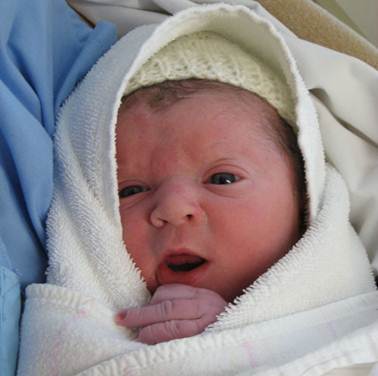Have you become the parents? It will certainly have a lot of
experiences containing both smiles and tears that are waiting for you to take
care of your baby. Therefore, to foster the baby better, you should learn the
fundamental knowledge about the development of your baby!

The mother’s love
helps the baby to adapt to the environment.
1
Infant
The development of
infants
Because of lying curled up in the mother’s womb, so when
being born, the infant still cannot immediately remove this posture with two
arms and two legs always slightly curling.
Do not worry, children’s arms and legs gradually straighten
and until the 6th month, they will stretch completely. Also, to help
children gradually adapt to the environment and the temperature outside, you
should make your children feel warm and safe as when lying in the mother’s womb
by rolling the diapers and blankets around them.
The change of mothers
Congratulations, you've just promoted. You have a baby. You
feel that your children are all in your life? Of course, you have been prepared
to know what to do for your children and how to do those things. You have so
many resources and tools available to assist you in caring for your children.
However, the best advice for you is: Do not force yourself to become a child
care expert immediately; be relaxed and calm. Children need time to get used to
their parents and parents need time to get used to their children.

Infants will
'donate' their parents a lot of experiences.
2
1-week-old babies
The development of babies
This time, baby's eyesight is still pretty fuzzy. Babies can
only see the objects close to them. They just look at your face clearly as you
come closer to them.
Do not worry if babies do not look directly into your eyes
directly at the first time. Infants tend to look at the eyebrows, hairline or
movement of your mouth. When children are 1 month old, they will begin to focus
on your eyes. A piece of research shows that babies like to see the faces of
the opposite people more than all other objects or colors (including light,
motion, black and white colors).
The change of mothers
Get familiar with breastfeeding: After two or four days
after birth, mothers will begin to produce milk and feel breasts swollen. This
change will make many mothers feel uncomfortable: not being used to baby’s
sucking the nipples, the state of swollen breasts. If you do not overcome these
feelings, breastfeeding is very difficult. The phenomenon of swollen breasts
will decrease when the mother starts breastfeeding. There are some useful ways
to reduce the pain as full of milk in breasts:
- Self-massage
by the warm shower when having a bath.
- Apply
the hot towel on the chest before each feeding.
- Squeeze
out a little milk before putting the nipple into the baby's mouth so that the
baby quickly gets familiar with milk breasts and the breastfeeding is easier.
- Wear
a bra reserved (for breastfeeding mothers).
- Let
children eat every 2-3 hours; do not be afraid to feed babies for the fear of
pain; feeding regularly is to reduce full of milk in breasts.
- Drink
plenty of water to maintain milk production.
- Let
babies suck both nipples of breasts.
- Apply
cool water to babies after feeding.

Because of lying
curled up in the mother’s womb, so when being born, infants still cannot
immediately remove this posture with two arms and two legs always slightly
curling.
3
2-week-old babies
The development of
babies
After the birth, children will take time to get used to
observing, listening as well as expressing a sense of the external environment.
You will be very difficult to distinguish children’s different manifestations
as sleepiness or hunger. The only way they can communicate with you is crying,
but you absolutely can communicate with your children by your voice and
gestures. Children will gradually recognize your voice, and recognize you among
others.
This time, babies love to be held in hands, caressed,
kissed, massaged and swung. They even respond when hearing your voice or seeing
your face and can recognize you in a crowd.
The change of mothers
Postpartum depression: You thought that you should have felt
very happy at the moment, but your mood is totally not like this case: you are
easy to cry, moody and irritable. For a week after birth, you are just at home
with the baby and lacking sleep. You are in need of postpartum recovery. You
have to take care of babies and feel lacking experience with your children and
receive less help. All of these things cause you to stress. Hormonal changes
can also adversely affect your mood. The worst risk you may encounter is
depression.
How to help mothers
release is as follows:
Share your feelings with your husbands,
relatives or connect online with other parents in order to always feel you're
not alone.
Take time for yourself: ask your husbands or parents to look
after your babies. You can visit a friend, go shopping or relax in the tub, or
go for a walk with your children to enjoy the fresh air.
Leave your work behind: You really need to relax and forget
your work by turning off the phone, avoid sitting at the computer.
See your doctor if the condition lasts more than a week and
you cannot relieve.
4
3-week-old babies
The development of babies
Children love and always need breastfeeding. When hungry, they
can even suck on their hands. To reduce children’s thirst, mothers can use a
very useful product that is the pacifier. The American Academy of Pediatrics says
that children sucking pacifiers at nap or bedtime will reduce the risk of SIDS
syndrome.
The change of mothers
Mothers and babies always have a strong "invisible
link". However, not all mothers feel this, and more than half of the
mothers also need a certain time to build a relationship with their children.
After giving birth, you have to be treated to restore your
health and do not have much time for babies. You feel guilty when you look at
your child like looking at a stranger. Do not blame yourself because building
relationships with children is similar to with others. You need more time and
emotional interaction. If after a few weeks, you still do not feel sentiment
with your babies and the feelings of emotional conflict continue, you are very
vulnerable to postpartum depression. You should not hesitate to see your doctor
as soon as possible to seek help; you will soon feel more comfortable.